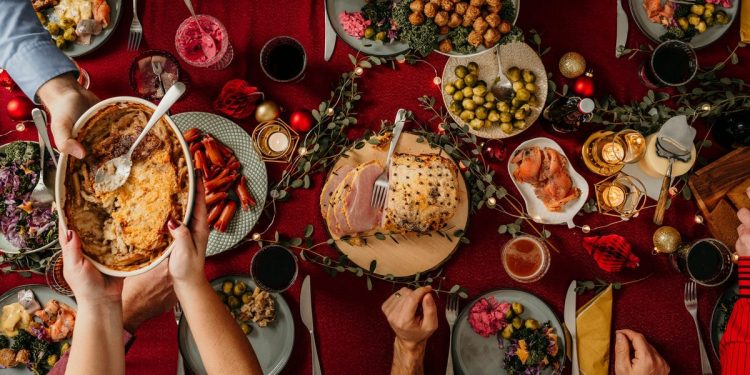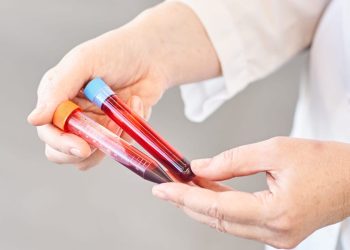- Coming together over food has always been a core part of my family’s holiday celebrations.
- In my 20s, an eating disorder took the joy out of gathering with family and friends.
- Now, my family gatherings — and the food at them — are enjoyable once again.
Food is a core part of holiday traditions for most families — especially mine. “Some people eat to live, but we live to eat,” my grandfather would always say. Every year, I looked forward to the over-the-top spread at Thanksgiving, and the countless decadent desserts on display at Christmas. It was wonderful — until I developed an eating disorder at 21.
How it started
I spent my last semester of college interning in Los Angeles — about two months in, after a devastating and blindsiding breakup with my boyfriend, my mother began losing our home back on the East Coast. I felt like I had lost control of the wheel. The one thing in my life I could control? What I ate.
It started with a food journal. I carried it everywhere, jotting down every single thing I put in my mouth. Even a couple of grapes or a small handful of granola had to be tracked and recorded. Then I began following several nutrition blogs and reading those oh-so-problematic “what I eat in a day” posts. Now I know that those bloggers’ meals didn’t provide enough calories for me, but at the time they were something I looked to for inspiration.
The false sense of control I gained from tracking calories and counting almonds was intoxicating — and my habits gradually spiraled. Soon I had to measure every tablespoon of peanut butter I spread on a sandwich or the oil I drizzled on a salad. It became impossible to enjoy a meal out with friends, because I knew I’d lie awake later that night riddled with anxiety about not knowing exactly what I’d consumed.
It’s funny. At the time, I felt so in control when in reality, the disorder had begun controlling me. It had the final say on where, what, and how much I could eat, and the joy I could derive from enjoying food with loved ones.
Needless to say, when the holidays rolled around that year, the emphasis on food no longer felt like a perk. Instead, it was agonizing. In the days leading up to Thanksgiving, I spent hours plotting how I could fool my family into thinking I’d feasted along with them while hiding food in a napkin. And then I spent countless sleepless nights after Christmas simultaneously shaming myself for my choices and wrestling with regret that I hadn’t allowed myself to indulge in my favorite treats.
Rebecca Strong
A turning point
This December marks 13 years since I hit rock bottom. And from this vantage point, it’s hard to believe that my eating disorder almost ruined all of my favorite holidays for me. Although my mom and other family members had urged me to get help, only I could make that decision for myself and put in the work it takes to recover. When I realized that my eating disorder was impairing my social life, dating life, and ability to travel while also holding me back from achieving my career goals and sapping all the joy out of fun celebratory occasions, I decided to seek professional help.
It took extensive therapy for me to get here — to unpack the fears and feelings at the root of my disordered thoughts and habits — but I finally reached what I consider to be a full recovery from my eating disorder at age 23. I feel so fortunate to have worked with Dr. Jennifer Thomas, a psychologist who has since become the co-director of the Eating Disorders Clinical and Research Program at Massachusetts General Hospital. During our weekly sessions, she gave me challenges to try at home that often felt uncomfortable — eating at different times than my usual schedule, incorporating “fear foods” back into my routine one by one, and offered invaluable support as I dug into the desperation for control that was driving my eating disorder.
Rebecca Strong
Now, I make a choice to be healthy every day
Since then, I’ve given several speeches at my local chapter of the National Eating Disorders Association to offer hope for people on their own recovery journey. During these speeches, I’ve made it a point to give people a realistic idea of what life looks like post-recovery. In setting those expectations, I’ve told them: “It’s not like your disorder disappears. It’s just so much easier to squash that toxic inner dialogue.”
Mindfulness has played a key role in my recovery — and the way I cope at food-focused holidays and other occasions. For so many years, I ignored what my body was trying to tell me. It got to the point where I didn’t even notice hunger cues or cravings anymore. Practicing mindfulness has helped me to tune back into those signals so that when disordered thoughts arise, I can check in internally and make decisions based on my body’s actual needs.
When surveying the family-style feast on Thanksgiving, my mind is sometimes quick to whisper: “You should load up on carrots rather than mashed potatoes,” or “You already had sugar-laden cranberry sauce, you should skip the pie.” The difference now is that it’s become easier to dismiss that voice, like an old frenemy whose advice and opinions I just don’t value any longer. And every time I opt to pay no attention to it, it gets a little bit quieter. Nowadays, I often reach the end of a holiday celebration realizing that I didn’t hear my eating disorder’s unhelpful input at all.
Research shows that only around 21% of people make a full recovery from an eating disorder. I’m very grateful to count myself among that minority because as the holidays fast approach again this year, I’m not worrying about how to “get through” while depriving myself of all the foods that bring me joy and pleasure. I’m far more focused on how grateful I am to even have access to these foods — something so many Americans lack.
My memories of those holidays during the peak of my disorder feel so hazy, like a photograph that’s faded beyond perceptibility. This year, rather than being distracted by my own anxious thoughts, I’m focused on being present with my family and friends. I want to remember every conversation — and every bite.










 American Dollar Exchange Rate
American Dollar Exchange Rate